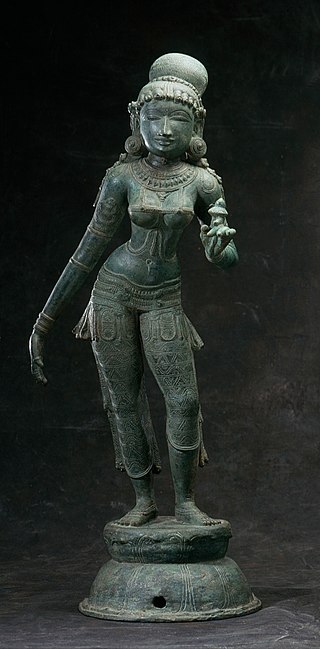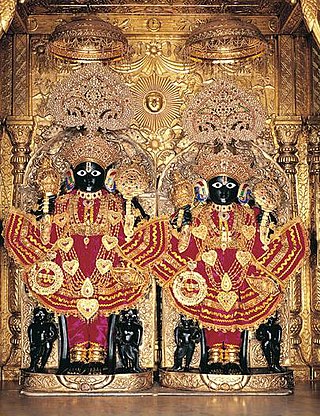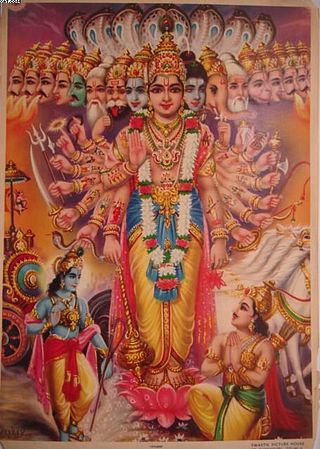Related Research Articles

Vamana also known as Trivikrama, Urukrama, Upendra, Dadhivamana, and Balibandhana, is an avatar of the Hindu deity Vishnu. He is the fifth avatar of Vishnu and the first Dashavatara in the Treta Yuga, after Narasimha.

Rukmini is a Hindu goddess and the first queen of Krishna. She is described as the chief of Krishna's wives in Dvārakā. Rukmini is revered as the avatar of Lakshmi and is venerated primarily in Warkari, and Haridasa tradition, and additionally in Sri Vaishnavism.

The Vishnu Sahasranama, is a Sanskrit hymn containing a list of the 1,000 names of Vishnu, one of the main deities in Hinduism and the Supreme God in Vaishnavism. It is one of the most sacred and popular stotras in Hinduism. The most popular version of the Vishnu Sahasranama is featured in the Anushasana Parva of the epic Mahabharata. Other versions exist in the Padma Purana, the Skanda Purana, and the Garuda Purana. There is also a Sikh version of the Vishnu Sahasranama found in the work Sundar Gutka.

The Bhagavata Purana, also known as the Srimad Bhagavatam, Srimad Bhagavata Mahapurana or simply Bhagavata (Bhāgavata), is one of Hinduism's eighteen great Puranas (Mahapuranas). Composed in Sanskrit and traditionally attributed to Veda Vyasa, it promotes bhakti (devotion) towards Krishna, an avatar of Vishnu, integrating themes from the Advaita (monism) philosophy of Adi Shankara, the Vishishtadvaita of Ramanujacharya and the Dvaita (dualism) of Madhvacharya. It is widely available in almost all Indian languages.

Naranarayana, also rendered Nara-Narayana, is a Hindu duo of sage-brothers. Generally regarded to be the partial-incarnation (aṃśa-avatara) of the preserver deity, Vishnu, on earth, Nara-Narayana are described to be the sons of Dharma and Ahimsa.

Telugu literature is the body of works written in the Telugu language. It consists of poems, short stories, novels, plays, and song lyrics, among others. There is some indication that Telugu literature dates at least to the middle of the first millennium, the first extant works are from the 11th century when the Mahabharata was first translated to Telugu from Sanskrit by Nannaya. The language has experienced a golden age under the patronage of the Vijayanagara Emperor-Poet Krishnadevaraya.

Atukuri Molla (1440–1530) was a Telugu poet who authored the Telugu-language Ramayana. Identified by her caste, she was popularly known as Kummara Molla. Mollamamba or Molla was the daughter of Kesana Setti who was a potter by profession.

Bhakta Pothana is a 1943 Telugu-language biographical film directed by K. V. Reddy in his directorial debut. Based on the life of poet-saint Pothana who translated Bhagavatham into Telugu language, the film was scripted by Samudrala Sr. The film had celebrated Jubilee runs all over the South India including Mysore state and Kerala. It was remade in 1966, starring V. Nagayya as Pothana.

The Devi Bhagavata Purana, also known as the Devi Purana or simply Devi Bhagavatam, is one of the eighteen Mahapuranas as per Shiva Purana of Hinduism. Composed in Sanskrit by Veda Vyasa, the text is considered a major purana for Devi worshippers (Shaktas). It promotes bhakti (devotion) towards Mahadevi, integrating themes from the Shaktadvaitavada tradition. While this is generally regarded as a Shakta Purana, some scholars such as Dowson have also interpreted this Purana as a Shaiva Purana.

The Dashavatara are the ten primary avatars of Vishnu, a principal Hindu god. Vishnu is said to descend in the form of an avatar to restore cosmic order. The word Dashavatara derives from daśa, meaning "ten", and avatāra, roughly equivalent to "incarnation".

The culture of Andhra Pradesh embodies some very exclusive and special entities.
Chilakamarti Lakshmi Narasimham was an Indian playwright, novelist and author of short stories, who wrote in the Telugu language. He was a romantic and a social reformer in the tradition founded by Veeresalingam. His best-known plays are probably Gayopakhyanam (1909) and Ganapati (1920).
Vavilla Ramaswamy Sastrulu and Sons is a 150-year-old Indian publishing house.

Andhra Vishnu, better known as Srikakula Mahavishnu statue, was set up in Andhra in a pre-existing older temple. The previous deistic form worshiped in the temple is unknown.
Jandhyala Papayya Sastry was an eminent Telugu writer and lyricist. He was popularly known as Karunasri because his writings expressively show compassion, one of the nine Rasas. His famous kavyas include Pushpa Vilapam and Kunthi Kumari.

Viswanatha Satyanarayana was a 20th-century Telugu writer. His works included poetry, novels, dramatic play, short stories and speeches, covering a wide range of subjects such as analysis of history, philosophy, religion, sociology, political science, linguistics, psychology and consciousness studies, epistemology, aesthetics and spiritualism. He was a student of the illustrious Telugu writer Chellapilla Venkata Sastry, of the Tirupati Venkata Kavulu duo. Viswanatha's wrote in both a modern and classical style, in complex modes. His popular works include Ramayana Kalpavrukshamu, Kinnersani Patalu and the novel Veyipadagalu. Among many awards, he was awarded the Jnanpith Award in 1970, the first for a Telugu writer, and Padma Bhushan in 1971.

Andhra Mahabharathamఆంధ్ర మహాభారతం is the Telugu version of Mahabharatha written by the Kavitrayam, consisting of Nannayya, Thikkana and Yerrapragada .The three poets translated the Mahabharata from Sanskrit into Telugu over the period of the 11–14th centuries CE, and became the idols for all the following poets. More than calling "Andhra Mahabharatham" as a translation of Sanskrit Mahabharatha written by Lord Ganesha under the supervision of Veda Vyasa, this Andhra Mahabharatham was an independent translation. Thus, this translation is not a stanza by stanza translation. These three poets wrote Andhra Mahabharatham in Telugu literature style, but keeping the same exact essence as that of Sanskrit Mahabharatham

Kodandarama Temple is a Hindu temple dedicated to the god Rama, located in Vontimitta town in Vontimitta Mandalam of Kadapa District in the Indian state of Andhra. The temple, an example of Vijayanagara architectural style, is dated to the 16th century. It is stated to be the largest temple in the region. It is located at a distance of 25 kilometres (16 mi) from Kadapa and is close to Rajampet. The temple and its adjoining buildings are one of the centrally protected monuments of national importance.

The Āmuktamālyada is a Telugu epic poem composed by Krishnadevaraya, the ruler of the Vijayanagara Empire, in the early 16th century. Amuktamalyada translates to "One who offered the garland after wearing it herself". Considered as a masterpiece, the Amuktamalyada describes the legendary wedding of the Hindu deity Ranganayaka, an avatar of Vishnu, and Andal, one of the poet-saints called the Alvars, at Srirangam.

Asavadi Prakasa Rao was an Indian poet, critic, translator and scholar, who is known for his poetry and prose works. He is noted for his significant contribution to Telugu and Sanskrit literature. In January 2021, he was awarded India's fourth-highest civilian award the Padma Shri in the Arts and Literature category. As Ashtavadhani, he has given 170 performances and has written and published 50 books across various genres. His most notable literary contribution is his performance of Avadhanam – a literary performance. He has received an honorary D Litt from Potti Sreeramulu Telugu University and a Distinguished Teacher award from the Department of Higher Education, Government of Andhra Pradesh.
References
- ↑ "A literary colossus". The Hindu . Chennai, India. 7 July 2003. Archived from the original on 23 October 2003.
- ↑ "TTD to release Pothana Bhagavatham". The Hindu . Chennai, India. 20 January 2007. Archived from the original on 22 January 2007.
- ↑ Sruti, Issues 148-159. 1997.
Potana was born in a Niyogi brahmin family; his father was Kesana and his mother was Lakkama.
- ↑ P.T, Raju; Rao. A Telugu Literature. India: Onal Book House.
- ↑ P.T, Raju; Rao. A Telugu Literature. India: Onal Book House.